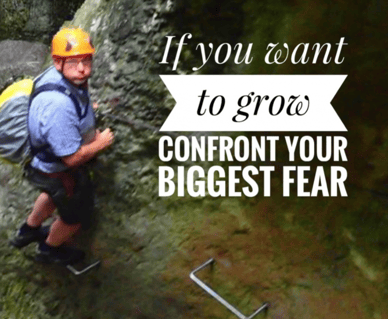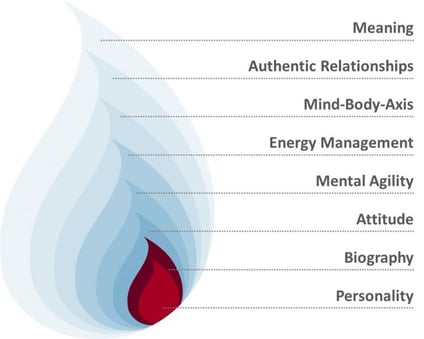Can you be Thankful? It Would Make you a Stronger Leader!
Did you know that by far the largest program to enhance resilience has been launched by the US Army...
Leaving our comfort zone often requires accepting a certain loss of control going alongside with the feeling of fear. This is nothing that executives particularly fancy – however it is key to success in today’s world.

What Got You Here Won’t Get You There
In our work with managers we repeatedly encounter situations in which the manager’s previously acquired knowledge, experience and tools are no longer sufficient or suitable to tackle the new challenges that come with a new career step or a changed role. Instead, these previous strengths sometimes even end up being a weakness. While specialist expertise and the capacity to act might previously have been important to underpin a manager’s credibility, it might well be a hindrance in the next step up the ladder where more empowerment, i.e. the delegation of responsibility, and fewer details are required in order to be able to tackle the dramatic rise in responsibility.[nbsp] This typically goes along with less control which is not pleasant for many people. Research suggests that this form of constant learning and re-learning will define the new normal of current and future management generations. This capability to learn how to learn and to accept being vulnerable during this process is also vital for your ability to cope with setbacks and adversity. It is called Mental Agility.

Mental Agility as a Key to Resilience
Mental Agility is a competence which both describes a personality trait manifesting itself as an inner stance as well as a habit based on a conscious decision. It is about never stopping to learn and to reacting flexibly to rapidly changing outer conditions and to be able to handle uncertainty and complexity in a sovereign way. This requires, on the one hand, a healthy intuition and, on the other hand, the self-consciousness of being able to live with suboptimal performance for a while. Above all, however, it requires a willingness to leave one's own comfort zone when entering new territory, as well as the ability and the will to improvise. Mental agility relates to being skeptical to extensive experiences and traditional concepts and to anticipate upheavals and disruptive change. As a personality trait, the openness for new experiences is partially innate to human personality. Different people are thus more or less open to change and leaving their comfort zone because of their fundamental personality construct. However, everybody can train the muscle of mental agility. This requires only two things: a conscious decision and the investment of mental energy. In our work with managers we often challenge them to develop this trait by confronting their biggest fear.
Let Your Fear Be Your Compass
What are you afraid of? People are afraid of many different things. The list of fears, phobias and anxieties is much longer than can be shown here.
List of most common fears:
What would be a good way to confront your biggest fear in a safe and playful way? I am generally not a very fearful person but I confess that I have my issues with heights. Anything higher than five meters makes me nervous - although I am perfectly cool on an airplane. So, this summer I decided to challenge myself in two ways. Firstly, together with my colleagues I climbed the roof of the Munich Olympia Stadium. Sounds more dramatic than it actually was but there was some 50 meters of air underneath my feet and I felt great relief after having done it. Secondly, during our family vacation in Italy, I engaged in some easy mountaineering. I was perfectly calm until we entered the first wall. As you can see from the picture the signs of fear were very visible on my face despite the fact that we were less than ten meters above the earth. With the help of a very hands-on and directive guide I made it somehow. I had pointed out that I was afraid of heights and he made sure that I was under his special care. However, there were still some moments where I seriously thought of giving up. Although it was really hard and exhausting for me I felt really great after having done it.
Getting from Fears to Insights
As important as confronting your fears is to analyze what has helped you in that particularly challenging situation so that you can apply it next time round.
So, here is what helped me when climbing:
So, when did you confront your biggest fear for the last time? And what were your learnings?

Karsten is passionate about getting to the core of things in leadership coaching. His clients often describe him as an intuitive, empathic and at times challenging sparring partner who asks the right questions.
He helps his clients to look at issues from a different angle to reach their goals.
Karsten has an extensive international business and leadership background gained over 16 years.
He held leading positions at Accenture, Bombardier Transportation and Dell. In his last position as Managing Director for DELL's consulting business, he built up the field of business consulting in Europe.
Karsten is a Leadership Coach since 2006. He is accredited by the European Mentoring and Coaching Council (EMCC)and the World Economic Forum. He published several articles and books on the topics leadership, coaching and resilience. Furthermore, he is a certified psychotherapist (naturopath) and works as faculty at the Center for Responsible Leadership at WHU business school in Koblenz.

Did you know that by far the largest program to enhance resilience has been launched by the US Army...

Nothing seems to be easier to answer than the question if you are successful. But the moment you...
Leave a Comment